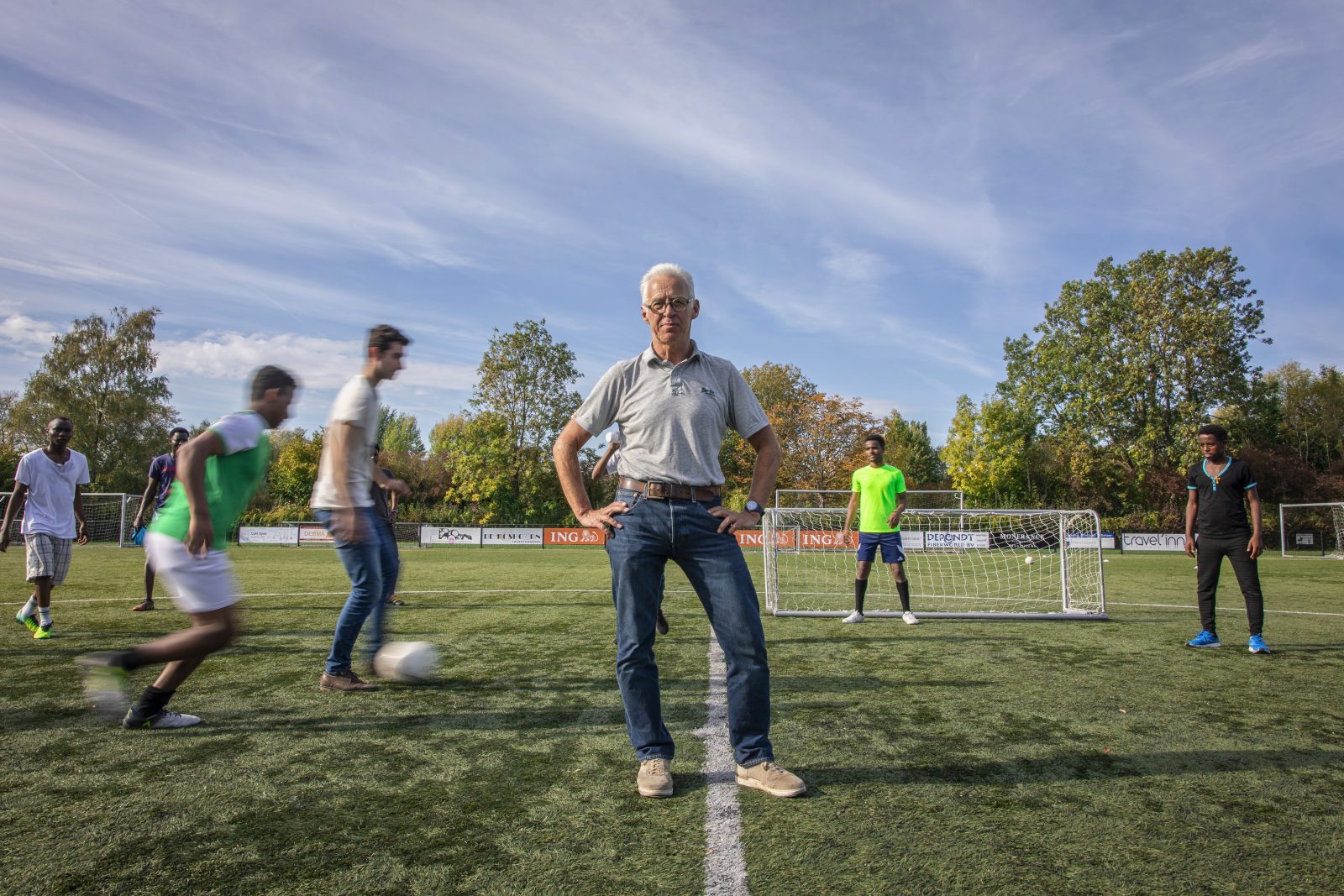Henk van Hezel bridges cultural differences on the football pitch
Sport brings people together; Henk van Hezel (67) knows that better than anyone. He himself goes cycling and swimming a few times a week. He also works, ‘but not 40 hours a week these days.’ He was a member of the board of football club SC Jekerdal for many years. The announcement of the creation of an asylum seekers’ centre prompted Henk to join forces with other sports clubs in the district to set up an initiative getting minor asylum seekers active in sports. He explains his motive for this: ‘It’s only when you meet other people that you can understand the cultural differences between you.’
Although Henk has been in intensive contact with asylum seekers from all over the world for over a year now, they still surprise him sometimes. ‘I once invited a few footballers from the asylum seekers’ centre to my home. They waited at my door for ages without ringing the bell. When I eventually opened the door, I discovered that they didn’t know there was a doorbell. It was the first time that they had been to a Dutch person’s home. It hadn’t occurred to me until then.
In August 2017, a group of 12 to 18 boys from the asylum seekers’ centre, mainly so-called ‘unaccompanied minor aliens’, started weekly training sessions at SC Jekerdal. The municipality approved a joint grant application from SC Jekerdal, Atletiek Maastricht, Ponyclub Maastricht, and Refugee Project Maastricht to allow the project to continue for the next two years. ‘Fortunately we also have enough sponsors and generous benefactors,’ says Henk. ‘Some of the boys come to the training sessions wearing flip-flops. We appealed to our members for football boots for them, and we were inundated with donations. Thanks to our sponsors, a number of children were also able to attend the ‘football school’ during the autumn school holidays. Logically, asylum seekers have little money to spend. If they become a member, we do ask for a contribution of up to five euros per month. In that way, we create a certain level of commitment, but a lack of money should never form an obstacle to taking part.’
Sporting behaviour
Henk can be found at the club every Tuesday evening. He’s not a coach; that role is left to 72-year-old ‘Grandpa Toon’. Henk is there to expand his network further, to share knowledge, and to check how things are going. ‘I love working with young people – it helps keep me young too. There is always something new to do. Right now, we are focusing on organizing the influx of younger players. We have several teams of children under the age of 15, and there is always room for one more player. You also see that everyone feels involved when there are young asylum seekers playing in a team. It is good for the Dutch children to get to know children from other cultures, and it’s a way for the young asylum seekers to settle in and relax here. And even if they don’t understand each other in words, there are basic things that everyone understands: you behave in a kind and sporting way towards each other, and you help each other out.
Good manners
Henk, who is always called ‘Mr Henk’ by the players from the asylum seekers’ centre, is full of praise for the manners of the footballers. ‘They always shake hands with everyone, are always willing to help clean up the changing room or look for balls. Every now and then you notice that cultural differences can lead to misunderstandings. For example, someone might not show up for training because he has arranged to meet up with his friends. That’s not a good enough reason in our book, but it’s perfectly normal in the group culture where they come from. We do also stick to our own rules. Anyone who arrives late for training has to run an extra lap. After all, you are a member of a team, and you have to do things for the team. The aim is to develop mutual understanding and respect.
As asylum seekers are regularly transferred to other municipalities, they are often only members of SC Jekerdal for a short time. However, there is a fixed group of asylum seekers who have been granted a residence permit and who are loyal to the club.’ It doesn’t matter to Henk whether someone stays for a long time or just a short period. ‘The main thing is that they can play football; we have no other agenda. The project leader himself continues to work with great enthusiasm to help these young foreign footballers. ‘For me, it just goes without saying. I want to help others if they need help.’

